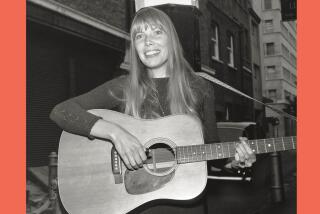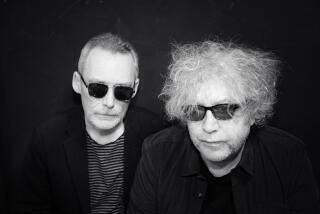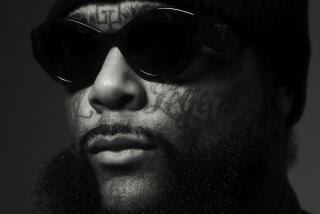Mish Barber-Way is one of the most compelling frontwomen in today’s punk era: ‘she isn’t afraid of anything’

- Share via
Mish Barber-Way, the lead singer of the punk band White Lung, lounged by her pool in her Arcadia backyard. Peacocks screamed across the street as her husband brought out Mason jars of iced coffee, and a gentle Southern rock record played from the living room stereo.
Everything seemed pretty sunny for the singer and her trio, which headlines the Teragram Ballroom on Friday. But even in this afternoon idyll, she couldn’t shake her fascination with humanity’s worst impulses.
Barber-Way doffed her mirrored sunglasses to talk about the rapes and killings committed by a Canadian couple referred to as the “Ken and Barbie Killers,” nearly three decades ago. Their crimes inspired the first-person narrative of “Sister,” from her band’s new album, “Paradise.”
“I have two sisters, and I just can’t imagine how any woman could do that to them,” said Barber-Way as she leaned over her patio table to recount the blood-chilling tale. “But no one ever calls themselves the evil side of a murder.”
That contradiction between her bright, beautiful L.A. life and her devotion to lurid mayhem drives “Paradise,” one of 2016’s best rock albums – and one of its most emotionally complicated. It’s partly an ode to the maturing love of the 30-year-old Barber-Way’s marriage, a radical statement of ideological independence, and a sordid travelogue through the worst things people can do to each other.
“Paradise” is White Lung’s fourth album. On 2014’s “Deep Fantasy,” their first for the respected major-indie Domino Records, the band found a new urgency that lifted them out of the DIY punk underground and onto bigger platforms.
Much of this is due to Barber-Way’s charisma and ambition (she’s also a freelance journalist who has written for The Times and other outlets). With her frost-blond hair, confident voice that edges into a violent howl, and evocative lyrics that lash out at the world and at herself, she’s one of the most compelling frontwomen of her era in punk.
But she’s also mercilessly skeptical of today’s easy-empowerment strains of feminism. On “Sister” and “Demented,” she writes with real curiosity about women who help their male partners kill girls. The LP has echoes of old blues and murder ballads, using incomprehensible violence as a way to plumb the human psyche.
Her journalism for outlets like Vice similarly touched on taboos like the rise of incest porn, and she’s especially proud of a new column for Hustler magazine for which she visited a live lesbian sex-show set. Nothing seems to make her flinch, and that sets her songwriting apart.
“With feminism today, I’ve gotten a lot more critical,” she said. “I’m a fan of writers like Camille Paglia and Christina Hoff Summers, and I feel like I don’t identify with a lot of my peers and that blanket PC-ness that doesn’t allow for disagreement.”
But “Paradise” is compelling for much more than its flair for the macabre. The record packs into its half-hour runtime an array of uncommon guitar textures, eerie harmonies and a few singles that nearly count as power ballads.
I feel like I don’t identify with a lot of my peers and that blanket PC-ness that doesn’t allow for disagreement.
— Mish Barber-Way

“We almost treated it like an electronic record, and let our guard down for a lot of stuff that would have been off-limits before,” said guitarist Kenneth William, who with drummer Anne-Marie Vassiliou crafted the rush of energy and sleekness that defines “Paradise.” “But I also like distilling records into the smallest possible package. I’d rather have one meal of prime rib than 20 McDonald’s cheeseburgers.”
“Below” is a straight-ahead shot at a modern rock-radio single. It sports some of Barber-Way’s most melodic singing yet, and a vintage-glam music video that shows the band performing for an audience of weeping Marilyn Monroe ringers.
“Mish is not afraid of anything, and that’s exactly what we need right now,” said producer and co-writer Lars Stalfors, who helped the band turn their writing process inside out on “Paradise.” “So many bands just don’t have anything to say, but she is an absolute force.”
White Lung is far from the first punk band to grow and pursue loftier commercial and creative aims. But for Barber-Way and her band, getting older turned out to be just as interesting as their youthful fury.
See the most-read entertainment stories »
The record closes with its title track, a song that Barber-Way plainly describes as a love song to her husband, and one unlike anything else in the band’s catalog. Contrasted with the violent character studies before it, the song feels almost even more radical.
“It’s awesome, marrying your best friend and dealing with life together. I can’t think of anyone I’d rather spend my days with,” she said. “I’ve always written about the distresses of life. But now I do think that domestic happiness really is possible.”
The Vancouver, Canada, native is perhaps the last person one would expect to have a giant framed Lynyrd Skynyrd poster on the wall of her exurban living room (“‘I Need You’ was our wedding song,” she said). But the confusion of falling in love, and the ways it makes you re-imagine yourself and what you want, were just as riveting to her as any true-crime serial killer yarn.
As the afternoon wound down, Barber-Way indicated she was ready for some pool time herself. A generous host, she extended the offer of a late-day swim to a visiting reporter. He regrettably had to decline, but not without a little good-natured ribbing from her first.
“Feel free to jump in,” she said. The pool was there for cutting loose, and, “I promise no one will judge your undies.”
More to Read
The biggest entertainment stories
Get our big stories about Hollywood, film, television, music, arts, culture and more right in your inbox as soon as they publish.
You may occasionally receive promotional content from the Los Angeles Times.










